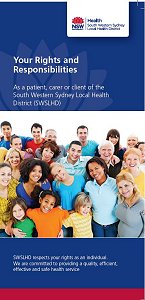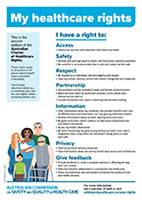 Download PDF |
Language: Arabic Assyrian Chinese Farsi Greek Italian Macedonian Serbian Spanish Vietnamese |
 View Poster Visit Website |
|
You have a right to health care In NSW, the public health system offers high quality services for a range of health care needs. You will be given access to services on the basis of a medical assessment of your condition and the urgency of your need for treatment.
In NSW, the public health system offers high quality services for a range of health care needs. You will be given access to services on the basis of a medical assessment of your condition and the urgency of your need for treatment.
Health care services are open to everyone regardless of gender, marital status, disability, culture, religious beliefs, sexual orientation, age or where they live in NSW. If the care required is not available locally you will be transferred.
Under Medicare some of these services are free or subsidised.
Emergency
In the event of a medical emergency, ring Triple Zero (000) and ask for an ambulance. Treatment is free at public hospitals to permanent Australian residents.
Highly qualified health care professionals will determine the urgency and seriousness of your condition and the type of treatment you require. Patients are treated according to who is the sickest and needs the most immediate attention, not on the basis of who arrives first.
Visitors to Australia, who require immediate and necessary treatment, may be entitled to Medicare cover under Reciprocal Health Care Agreements with their country. For information about Medicare eligibility go to: https://www.servicesaustralia.gov.au/medicare or ring 132 011.
Non-urgent health care
If you have a minor illness or injury you should visit a general practitioner or an after-hours medical centre.
If you can't get to a doctor or after hours medical centre you can ring healthdirect Australia, a 24-hour telephone health advice line 1800 022 222.
A Registered Nurse provides expert health advice.
Access to surgery
If your treatment requires surgery and is not urgent you may need to wait. If you are waiting to be treated in hospital and are worried, contact the Waiting Times Coordinator for your health service. For contact details visit:
www.health.nsw.gov.au/hospitals/waiting times or ring the Surgery Access Line on 1800 053 456
Ambulance services
Ambulance services are not covered by Medicare. You are responsible for paying and fees regardless of whether or not you requested the ambulance. For further information about ambulance fees visit: www.ambulance.nsw.gov.au
You will not be charged with ambulance fees if you
Public and Private health care
You have the right to use public services as a public or private patient. If you choose to be treated as a private patient you are responsible for the cost.
Some items such as TV hire, particular prescription drugs and appliances, are not covered by Medicare or Private insurance. Contact the admissions office at your hospital to find out.
In an emergency you, or the people supporting you, will be told about these costs by the hospital's admissions office.
You have a right to safe and high quality health care You will be given access to the services you require. Your treatment and care will be based on your assessed needs, regardless of your financial situation or whether you hold private health insurance.
You will be given access to the services you require. Your treatment and care will be based on your assessed needs, regardless of your financial situation or whether you hold private health insurance.
If you require urgent care to prevent loss of life you will receive it immediately.
It is important to tell your health care provider your medical history including allergies and any medications taken.
Open Disclosure
NSW Health is continually reviewing the way things are done to ensure the safest and highest quality care. We gather information on any incident that might compromise care even if it did not cause harm.
If something goes wrong with your treatment or care we will tell you about it as soon as possible. We will apologise, explain what happened, tell you about the possible effects and what we are doing to prevent it happening again.
To read more about how we handle health care incidents go to:
https://www1.health.nsw.gov.au/pds/Pages/doc.aspx?dn=PD2014_028
You have the right to respect, dignity and consideration
You will be treated in a manner that shows courtesy and consideration for your culture, beliefs, values and any personal characteristics, such as gender or disability.
Visitors
Your right to receive visitors will be respected and you will be given privacy.
You have the right to have visitors with guide dogs.
Respecting others
You have the right to be treated with respect and we ask that you show this courtesy to others. We ask people seeking or receiving care, their families, support people and visitors to:
NSW Health has a zero-tolerance approach to threatening, abusive or violent behaviour by any person. We will take appropriate action to protect people and property.
NSW Health's Zero Tolerance Response to Violence in the NSW Health Workplace
You have the right to be informed about services, treatment, options and costs in a clear and open way Health care providers will explain you condition, the proposed treatment, as well as the risks and the alternatives. They will also ask questions to make sure they provide the best possible care. You can contribute by being open, honest and asking questions when you do not understand.
Health care providers will explain you condition, the proposed treatment, as well as the risks and the alternatives. They will also ask questions to make sure they provide the best possible care. You can contribute by being open, honest and asking questions when you do not understand.
Interpreter Services
You can have an interpreter if you speak another language. This is a free service. Translation services can be provided in person or by phone and are available seven days per week. Ask staff to arrange an interpreter for you. AUSLAN Interpreters are also available.
Support people
You can have a relative, carer or other support person to help you communicate with health professionals but you must agree to that person being involved in your affairs.
NSW Health recognises that sometimes your support person may be under 18 years of age. We respect the role of younger carers. They will be included in your treatment and ongoing care and given information on where to get support.
We also recognise that people with disabilities have a range of support needs. In this case, family members, carers and other support people may be asked to assist you and the healthcare staff. However they are not obliged to help.
You will also be asked to provide the name and contact details of the person who can give consent for procedures if at any time you are too ill to give that consent yourself.
Providing information
Give your health care provider as much information as possible about your health, including any allergies, medical conditions or disabilities. Tell them if you use other medicines or remedies and whether you smoke, use alcohol or other recreational drugs.
Tell your health care provider:
You will be regularly asked to confirm your name, date of birth and other details before any procedure or surgery and whether you are transferred to another service for care. This ensures that you are correctly booked in for the right procedure by the right person at the right time throughout your treatment.
You have the right to be included in decisions and choices about care Throughout your visit, health care providers will discuss treatment plans with you. You are encouraged to take part in these plans, including transfers to other services and your discharge from hospital.
Throughout your visit, health care providers will discuss treatment plans with you. You are encouraged to take part in these plans, including transfers to other services and your discharge from hospital.
You are encouraged to ask questions and talk with your other health care providers and relatives before making decisions.
You have the right, where circumstances permit, to have a relative, carer or other support person with you at all times.
https://www.safetyandquality.gov.au/sites/default/files/migrated/Tips-for-Safer-Health-Care-PDF-302KB.pdf
Seeking a second opinion
You have the right to seek a second opinion on treatment that has been recommended for you. Depending on the nature of your condition the health service will provide advice on the availability of an alternative medical practitioner.
Consent
You must give consent before receiving treatment. In most cases this will be verbal consent. Written consent is required for some procedures, such as surgery.
You have the right to withhold consent. In this case you will not receive treatment. In a life-threatening emergency where you are too ill or unconscious, consent is not required.
Consent by others
Children under the age of 14 years must have the consent of a parent or guardian.
Children between the ages of 14 to 16 years usually give their consent jointly with their parents or guardians; however they can give sole consent as long as they show that they fully understand the proposed treatment.
If you are unconscious or too ill to give consent yourself, a relative, carer or other person close to you can give consent for treatment considered by qualified health professionals to be in your best interests.
If this person is unavailable the Guardianship Tribunal can give consent. For more information visit?
www.gt.nsw.gov.au or ring: 1800 463 928.
Research and education
You may be asked if students or health employees in training can be present while you are receiving care or treatment. This practice contributes to the development of professional skills. You may also be asked to participate in medical research.
You have the right to say no to these requests. Your decision will not be put in your records and will have no bearing on your treatment or access to services in the future.
You have a right to personal information being kept private and confidential
Your medical information will be kept secure. The information may be shared with other health care providers to help make decisions about your treatment.
You have the right for the confidentiality of your condition and treatment to be maintained.
The right to medical record information
You have the right to speak to a healthcare worker about the information contained in your medical record.
You can also request a copy of your medical record.
Requests to view or obtain a copy of a medical record are made to the Manager of the health service you attended.
Other people, such as a family member or legal guardian can view your medical record if authorised.
For further information go to: personalInfo.html
Breach of privacy
Sometimes your doctor may decide that the information contained in your health records may adversely affect your physical or mental wellbeing. At other times the contents of the record might breach another person's privacy. In these cases you might be denied access to your records.
You, and others who are authorised, have the right to take the matter further.
Under Health Privacy Legislation (section 12.3) you can ask for an independent doctor to review the contents of the medical record and make a recommendation.
If access is still denied you can request more senior managers in the health service conduct an internal review.
For further information speak to the Privacy Contact Officer in your health service or go to
personalInfo.html
The NSW Privacy Commissioner can also investigate complaints about privacy. For more information go to www.lawlink.nsw.gov.au/privacynsw
If you are not satisfied with the outcome of an internal review you have the right to apply to the Administrative Decisions Tribunal. For more information go to personalInfo.html
Special circumstances where medical information may be disclosed
Aspects of medical information can be released in special circumstances. These include:
Aspects of personal health information may also be disclosed for research projects. In this case the use of patient information must comply with strict protocols and be approved by a Human Research and Ethics Committee.
A privacy leaflet containing more information is available in English and other languages at:
personalInfo.html
You have the right to comment on care and have your concerns addressed NSW Health wants to hear your comments on health care. It is important to know when things require improvement and when they are going well.
NSW Health wants to hear your comments on health care. It is important to know when things require improvement and when they are going well.
Compliments
Compliments provide a clear indication of what you seek in high quality care. They also boost morale and encourage health employees. Health services make sure compliments are passed on.
Complaints
It is best to resolve complaints with your healthcare provider in the first instance. Try to remain calm and be as clear as possible about what happened and how you would like it resolved.
It is a good idea to keep a note of the time and date of the discussion, what was discussed and what agreements might have been reached.
Alternatively you can contact the health manager or patient liaison officer during business hours. Out of these hours you can contact the senior nurse on duty.
These people will ensure your complaint is treated confidentially as well as:
If you are not satisfied with the outcome you can contact your health service.